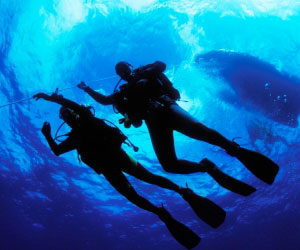What You’ll Learn Scuba Diving
Anyone can become a scuba diver, but it does take work. You have to learn underwater skills, master scuba equipment, learn about science, and practice it all until it is second nature.
What you learn in your initial diving certifications will stay with you for your diving career. It will open your life to a new underwater world.
Learning new things is important for everything you do. It’s a part of life. And you’ll appreciate your solid diving education when you’re floating in the middle of a school of angel fish, or when you see a moray eel slither out of its coral cave for the first time.
You may wonder what types of things will I learn in diving? Well, here’s a taste…
The science of diving can be intimidating, but a good dive instructor can make it seem simple. Pressure is a big factor in diving. It effects how your ears and body regulate as you dive. It affects how your lungs expand and contract; think of a balloon and what happens as you push it underwater. Pressure truly affects your body, but if you learn how to manage it, it isn’t a big problem. Another aspect of diving science that comes into play is decompression. This comes from diving too much or too deep.

Learn how to Scuba Dive
In order to stay safe, you’ll learn all about dive tables, air mixes, and surface intervals – even how it affects your nightly glass of wine and when you fly home.
Dive equipment is the key that allows us to breath underwater. It may be hard to walk around with a BCD (buoyancy control device), wetsuit, air tank, and flippers when you’re on dry land, but once you are drifting along a vivid coral reef, every piece of equipment you have is useful. In the certification process you’ll learn all about different types of equipment and how it works, when to use it, and what works best for you.
Diving skills are required for diving. It sounds simple, but there are skills that your dive instructor will want you to have mastered before you dive. Lots of the skills you may never use, but when your mask fills up with seawater and your eyes start to sting, you’ll be extra glad that you know how to clear your mask. You’ll get to learn safe ascend and descent techniques, mask clearing, buddy breathing, hand signals, weighting, buoyancy, entrance and exit techniques, and plenty of other things.
You’ll learn about the local ecosystem and how it dictates the equipment you use. You can imagine that learning in the cold waters of Maine might require different, and warmer equipment than learning to dive in the tropical waters of the Philippines.
As you progress in the diving world, you learn specialty diving skills or focus on technical diving certifications. Then the learning experience seems endless. Underwater photography, cavern diving, night dives, drift diving, enriched air mixes, deep diving, shipwreck exploration, underwater navigation, ecology, and altitude diving are just the beginning.
Eventually the diving certifications teach you underwater and surface rescue techniques.You’ll have to master basic life support, how to deliver oxygen, manage accidents, find lost divers, and how to deliver first aid.
Scuba diving is an endless continuing education. There is always something new to learn. It may be fish identification, avoiding decompression after diving to 60 meters, or understanding how to ascend to the surface so your lungs don’t explode, but everything you learn will come in handy. Just be sure to open your mind and let all of that diving knowledge soak in.


 Teach English in Asia
Teach English in Asia  Cruise Ship Jobs
Cruise Ship Jobs  Alaska Fishing Industry Jobs
Alaska Fishing Industry Jobs  Sharing Economy / Gig Economy
Sharing Economy / Gig Economy